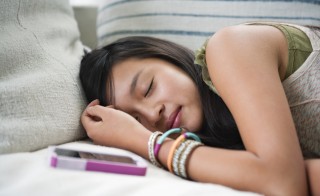(单词翻译:单击)
HARI SREENIVASAN, PBS NEWSHOUR WEEKEND ANCHOR: A study published by the Centers for Disease Control and Prevention this weekend finds that sleep deprivation among teenagers can increase their risk of sports injuries and car crashes.
Dr. Anne Wheaton is one of the study's authors. She joins me now from Atlanta to discuss this.
So, what does the data reveal?
DR. ANNE WHEATON, CENTERS FOR DISEASE CONTROL AND PREVENTION: So, we know that unintentional injury mostly from motor vehicle crashes is the major cause of death in adolescents and we have been studying sleep at CDC since 2007, and we have a lot of data from high school students asking about lots of different risks behaviors. But we have yet to look at injury-related risks behavior.
So, we look at whether they wore their bicycle helmets when they were riding bikes. Whether they wore their seatbelt, whether they got into a car with a driver that had been drinking, whether they themselves had been drinking and driving, and whether they texted and drove.

HARI SREENIVASAN: Uh-huh.
DR. ANNE WHEATON: And so, we found that all of these risk behaviors were significantly higher in teens that got seven or fewer hours of sleep per night, compare to nine hours, which is kind of the median recommended sleep for adolescents.
HARI SREENIVASAN: Is this because they're drowsy and being kind of sleepy behind the wheels? It's actually almost as bad as being drunk.
DR. ANNE WHEATON: Well, that's part of it. What was kind of concerning about our results was the strength of the association between not getting enough sleep and drinking and driving, because if we look at the data for teens that got nine hours of sleep, almost 5 percent reported that they had driven drunk in the previous month, and if you went down to, they only got six hours of sleep, that doubled to 10 percent. And then if they reported four or fewer hours of sleep, it went all the way up to 17 percent.
So, they're more likely to be drowsy on top of having been driving.
HARI SREENIVASAN: Is there such a thing as too much sleep?
DR. ANNE WHEATON: Previous studies by us and other groups have found that having longer than average sleep is sometimes associated with certain risk behaviors and health outcomes. And actually, we did find that in our study. We found, there were an increase risks for driving without their seatbelt. Drunk driving, riding with someone that had been drinking.
But why this might be the case, we can't really piece out with this data. It could be because teens that sleep too much may be depressed and that's been associated with engaging in risky behaviors. But from this data, we can't really make any assumptions.
HARI SREENIVASAN: Finally, there's always been this conundrum of schedules, that, you know, early, early, early morning is when high school students end up going to classes. And ironically, the tinier the kids are in their households, it seems the earlier they wake up. But then pre-school and kindergarten and first grade, they usually start later.
DR. ANNE WHEATON: Right. So, for one of the earliest signs of puberty is this delay in sleep cycle, so that adolescents are — have a harder time falling asleep earlier in the evening, and in the morning, they really should be sleeping in later.
They're also more likely to have bad sleep habits, having electronics in the bedroom, having irregular sleep schedule, so that, you know, they get up early all week, but then on the weekend, they try to make up for that sleep, which doesn't work, by the way. But then, Monday comes around and they have to struggle to get back into a good schedule.
But then, on top of that, we do have early school start times, and we published a report last year that showed that for a middle school and high school students, only one out of six started at 8:30 or later, which the American Academy of Pediatrics has recommended.
HARI SREENIVASAN: All right. Dr. Anne Wheaton from CDC, joining us from Atlanta today — thanks so much.
DR. ANNE WHEATON: Thank you.


